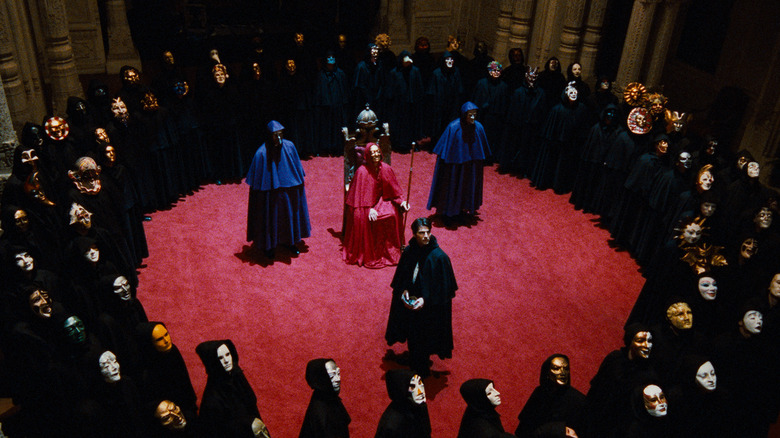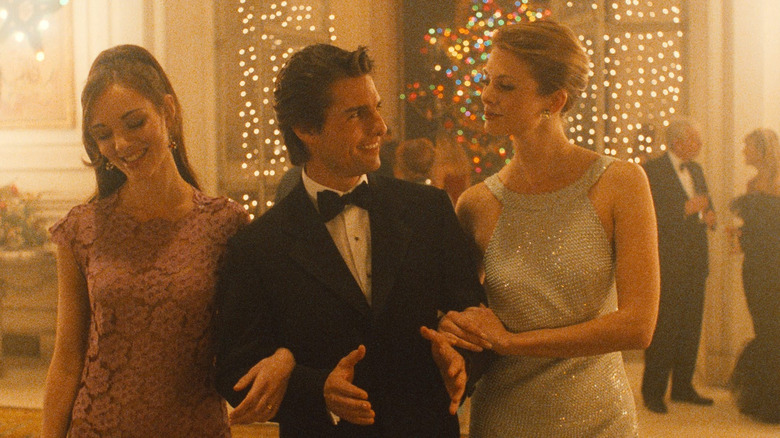Nearly 30 Years Later, Stanley Kubrick's Final Movie Is Finally, Actually Finished [Exclusive]
We may receive a commission on purchases made from links.
When Stanley Kubrick died in 1999, he left behind a final film: "Eyes Wide Shut." While Kubrick had finished shooting the movie (after an astoundingly long 400 day production) and delivered a cut, a question lingered: How final was this cut, exactly? The honest answer is we will never know. We can take guesses, though, and Kubrick, who was an obsessive perfectionist, had a reputation for tinkering with his films right up until release — and sometimes even after, as both "2001" and "The Shining" were recut following initial screenings. Kubrick fans and obsessives are all but certain that had he lived, his version of "Eyes Wide Shut" would probably not be the same version that's available today.
According to Nathan Abrams and Robert P. Kolker's book "Eyes Wide Shut: Stanley Kubrick and the Making of His Final Film," Kubrick, who spent the last years of his life in the UK, shipped a copy of the film to America for Warner Bros. and stars to screen, which they did on March 2, 1999. On March 5, the film was screened again at Kubrick's estate with another Warner Bros. executive in attendance.
But that was the end of Kubrick's involvement in the film, as he died during the evening of March 7 from a massive heart attack. After Kubrick's death, his assistant Leon Vitali (who also has a small role in "Eyes Wide Shut") took it upon himself to oversee whatever post-production work needed to be done. But the question remains: Was "Eyes Wide Shut" really ever finished? It depends on who you ask.
Eyes Wide Shut cinematographer Larry Smith has overseen a new 4K restoration
One person who felt the film was never quite done was Larry Smith, who worked as a cinematographer on the picture. Smith actually left the film two weeks before production wrapped, with Kubrick shooting the remaining footage himself (according to Abrams & Kolker). From there, Smith had no more direct involvement with the film — until now. Nearly 30 years later, Smith has overseen a new 4K restoration of "Eyes Wide Shut" for the Criterion Collection.
This restoration is not without controversy. Some chatter on Film Twitter and physical media forums has claimed that the 4K Criterion "Eyes Wide Shut" changes the look of the film significantly. I don't quite agree. Yes, some shots are a bit darker than the previous DVD and Blu-ray release of the film, but I didn't find the differences to be distracting or detrimental.
As for Smith, he feels like this is more or less how he would've made the film look had he been brought in to grade the picture before release back in 1999. "The tragedy of that was, that after [Kubrick] delivered the final cut, the film wasn't completely finished in terms of color grading," Smith told me in an exclusive interview. "So you could arguably say the film was always going to be 70-odd-percent, 80% in the area that it should have been, but it wasn't finished, and it got finished by other people in the chaos after he died."
Is this Eyes Wide Shut in its final form?
Smith added that he "wasn't too pleased with" the version of the film he saw at the premiere in 1999, stating that he wished he had been brought in back then to work on the color grading. "So the film was never finished," Smith said. "I would say definitely not to [Kubrick's] standard, and certainly not the way I would've finished it."
For the new 4K, Smith said he worked with Criterion and performed a "whole grading session based on how I felt it should be." As an example of some changes, Smith mentioned that he was able to remove the reflection of an assistant camera person who could be glimpsed during a bathroom scene. Knowing the way film fans think, I'm sure this will open up a new question: Is this new 4K version really what Kubrick would have wanted, or is this instead Smith's interpretation?
Again, we can never know for sure. But I think Kolker and Abrams sum things up nicely in their book, writing: "[W]hat we see of 'Eyes Wide Shut' is what we will always see. Whether it might have been different in some small way is ultimately irrelevant and certainly counterproductive to our understanding of the film and the pleasure we take from it."


